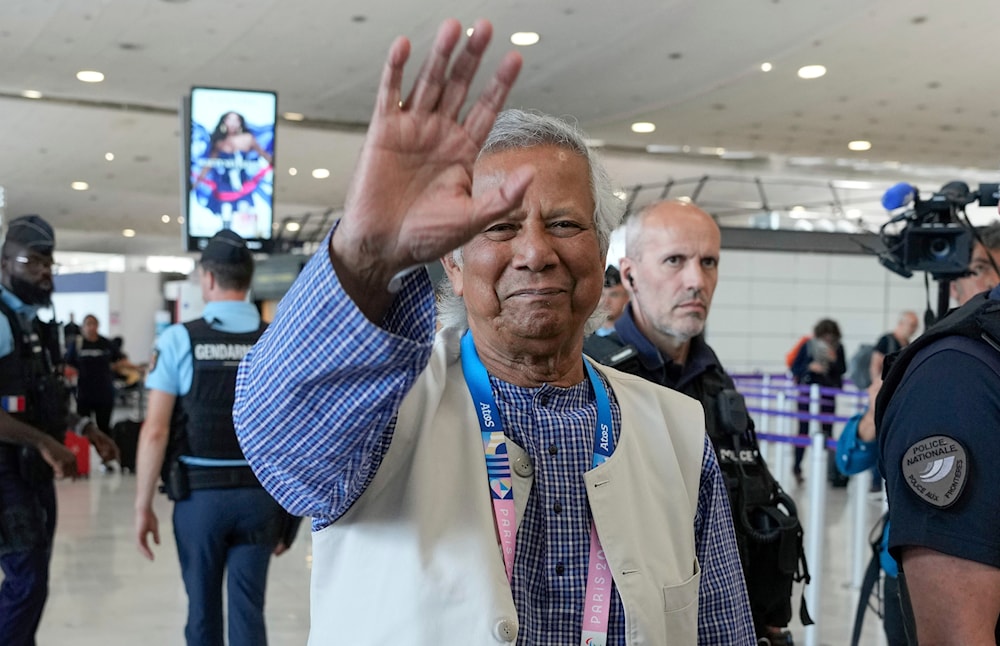Nobel laureate Muhammad Yunus lands in Bangladesh to lead new gov.
The Bangladeshi army chief announces the army's full support of Yunus' leadership of the interim government after Sheikh Hasina fled to India.
-

Nobel laureate Muhammad Yunus waves goodbye to the media at Charles de Gaulle's airport in Roissy, north of Paris, Wednesday, August 7, 2024. (AP)
Following a student-led movement that terminated Sheikh Hasina's 15-year rule, Nobel Peace Prize winner Muhammad Yunus returned to Bangladesh on Thursday to assume the role of caretaker government leader.
Soon after 2:00 pm (0800 GMT), Yunus arrived in Dhaka from Paris via Dubai, while Hasina was forced to fly to neighboring India when the military turned on her over the weekend.
In response to student demands, the military recognized Yunus as the head of the interim government.
Talking to reporters in Paris, Yunus said, "I'm looking forward to going back home, see what's happening and how we can organise ourselves to get out of the trouble we are in."
General Waker-Uz-Zaman, the head of the Army, stated that he supports Yunus and hopes that he will take the oath of office as head of the temporary administration on Thursday night.
"I am certain that he will be able to take us through a beautiful democratic process," Waker said, especially as Yunus claimed he intends to hold elections "within a few" months.
International Crisis Group analyst Thomas Kean expressed, "The protests are a seismic moment in Bangladesh history," adding, "The country really had been at risk of becoming a one party state, and through a peaceful street-based movement led by, Gen Z students in their 20s, they've managed to force her from power."
Tuesday saw the dismissal of the police chief, who demonstrators had accused of spearheading Hasina's crackdown.
Mainul Islam, the new chief, promised a "fair and impartial investigation" into the deaths of "students, common people, and the police" and apologized on Wednesday for the actions of the officers.
Along with the liberation of several political prisoners, Khaleda Zia, the 78-year-old former prime minister and chairperson of the BNP, was also freed from years of house arrest.
'A glorious day for a second independence'
Some generals deemed close to Hasina have been downgraded by the military, while Ziaul Ahsan, the head of the paramilitary unit known as the Rapid Action Battalion, has been fired.
Authorities reported that crowds had released over 500 prisoners from prison and carried out retaliatory attacks against Hasina's allies.
Statues of Sheikh Mujibur Rahman, the nation's independence hero, and Hasina's father, were demolished as demonstrators stormed parliament and set fire to TV stations.
At least 93 people, including 14 police officers, were killed with over a thousand wounded on Sunday amid violent clashes between the police and anti-government demonstrators during nationwide protests demanding the resignation of Prime Minister Hasina, marking one of the deadliest demonstrations since they ignited in July.
Yunus on Thursday paid tribute to those killed in deadly protests that toppled Hasina's government, saying their sacrifices had brought the nation a "second independence".
"Today is a glorious day for us," he told reporters at the airport in Dhaka shortly after returning to the country to lead a caretaker government. "Bangladesh has created a new victory day. Bangladesh has got a second independence."
Waker-Uz-Zaman stated at a news conference that the army, the navy, and the air force will all cooperate to support Yunus.
"I felt very good talking to him. It seemed to me that he is very eager to do this job. I am certain he will be successful in taking us to a democratic process, and that we will benefit from it," the Daily Star quoted him as saying.
Yunus is a social entrepreneur known as the "banker to the poor" for his mission to combat poverty and famine in Bangladesh with his microfinancing work through his non-profit company, Grameen Telecom, which he founded in 1983.
“I found it difficult to teach elegant theories of economics in the university classroom, in the backdrop of a terrible famine in Bangladesh. Suddenly, I felt the emptiness of those theories in the face of crushing hunger and poverty,” Yunus said in his 2006 Nobel acceptance speech.
Back in January, Yunus, along with three other people, was sentenced to six months imprisonment for violating labor laws at Grameen Telecom having failed to legally create a workers' welfare fund. In June, Yunus told The Guardian he faced 20 years of pressure from the Bangladeshi government for his work that aimed to enhance the lives of millions of impoverished people, especially women.

 4 Min Read
4 Min Read










